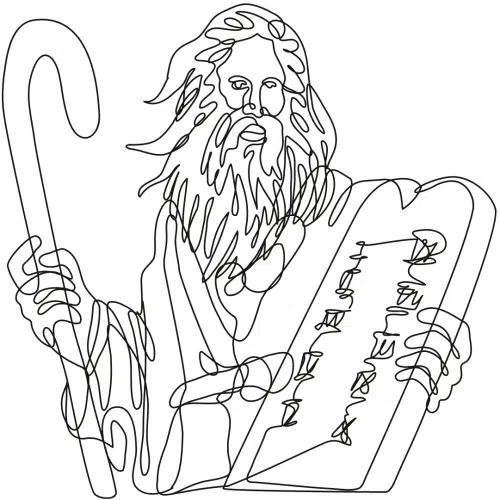Growing up, one of my all-time favorite movies was (and still is) The Ten Commandments directed by the legendary director, Cecil B DeMille. While this movie is an epic rendition of the story of Moses, the writer’s handling of the name of God is quite unique and offers insight into modern thought regarding this subject. In his book, Shattering the Conspiracy of Silence, author Nehemia Gordon points out how the filmmakers presented God as having no name.1 In the movie when Moses is searching for his true identity, he says to Yochabel, “Will you swear in the name of this God that you are not my mother? Yochabel then responds, “We do not even know His name.” Later, when banishing Moses to the desert, Ramses says, “I commend you to your Hebrew God who has no name. “Then again, in the land of Midian, Jethro says to Moses, “He who has no name surely guided your steps.” Now, The Ten Commandments is not Scripture, but it is a movie made by men, for Hollywood. However, it is interesting to see how the writers followed longstanding tradition and deliberately refer to God as “He who has no name,” a phrase that is never used in the Bible. Then finally, when Moses is at the burning bush, he asks God the question, “But if I say to your children that the God of their fathers has sent me, they will ask ‘What is his name?’ How shall I answer them?” From the burning bush, he hears the voice of God say, “I am, that I am. Thou shalt say ‘I am’ hath sent me unto you.” Then, the scene ends. The name of God is never used. The name of God is never uttered. The name of God remains unknown. In fact, as this scene unfolds in the movie, it sounds as if God’s name is “I Am.”
This record in Scripture at the burning bush is an introduction to understanding the name of God, and sadly it has been misunderstood. Moses had lived 40 years in Egypt. He ran away to the land of Midian where he lived another 40 years. Then, at 80 years old while tending sheep on Mount Horeb, the angel of Yahweh appeared to Moses in a burning bush. Moses then asked God how he should respond when he is asked by the sons of Israel, “What is His name?”
Exodus 3:13-14
Then Moses said to God, “Behold, I am going to the sons of Israel, and I will say to them, ‘The God of your fathers has sent me to you.’ Now they may say to me, ‘What is His name?’ What shall I say to them?”
God said to Moses, “I AM WHO I AM”; and He said, “Thus you shall say to the sons of Israel, ‘I AM has sent me to you.'”
Verse 14 is not indicating the name of God; rather, this verse shows the meaning behind the name of God. It is common in the Hebrew Scriptures when first introducing a name to present the etymology of the name as well: Gen 16:11b – “…And you shall call his name Ishmael, Because the LORD [Yahweh] has given heed to your affliction;” Gen 25:25 – “Now the first came forth red, all over like a hairy garment; and they named him Esau;” Gen 25:26 – “Afterward his brother came forth with his hand holding on to Esau’s heel, so his name was called Jacob;” Ex 2:10b – “And she named him Moses, and said, ‘Because I drew him out of the water’.”
The record in Exodus 3:14 is not revealing the name of God, but rather the meaning behind the name. The actual name of God is told Moses in the next verse.
Exodus 3:15
God, furthermore, said to Moses, “Thus you shall say to the sons of Israel, ‘The LORD [Yahweh], the God of your fathers, the God of Abraham, the God of Isaac, and the God of Jacob, has sent me to you.’ This is My name forever, and this is My memorial-name to all generations.
When the English translators chose to replace the name of God (“Yahweh”) with the title (“The LORD”), the name of God and the understanding here in Exodus 3:15 were lost. However, as we read it as written in the actual text, this answer to Moses is beautiful. Verse 14 gives the etymology of God’s name, and verse 15 reveals His memorial name, Yahweh – the God of Abraham, the God of Isaac, and the God of Jacob.
The meaning of the phrase “I AM WHO I AM” has been a source of much theological discussion. The words “I am” are the Hebrew verb “hayah” which is a simple verb meaning “to be.” This verb in various conjugations is translated as “was,” “is,” “will be,” “became,” “shall be,” etc. Here in Exodus 3:14, the verb is in the QAL imperfect form. Most often, when the Hebrew verb is in this form, it is translated as “I will be” or “I shall be.”
The English rendering of the Greek Septuagint (LXX) from this verse offers a very good understanding − “I am THE BEING.” The New Jerusalem Bible is similar –“I am He who is.” Interestingly, in the English version of the modern day Hebrew Tanakh, the translators use a transliteration of the Hebrew and don’t even give an English equivalent.
Exodus 3:14 (English-Hebrew Tanakh)
And God said to Moses, “Ehyeh-Asher-Ehyheh.” He continued, “Thus shall you say to the Israelites, ‘Ehyeh sent me to you.’”
Nehemia Gordon offers an excellent understanding of the meaning of God’s name.
God’s name YHVH derives from the exact same Hebrew root as “I am.” Strictly speaking, this name is a combination of three forms of this Hebrew root: Hayah, Hoveh, and Yihyeh. These three words mean respectively: “He was,” “He is,” and “He will be.” When we call Him by His name, we are essentially saying, “He has always existed, He exists now, and He will always continue to exist.” God says, “I am” about Himself but we are to call Him YHVH meaning, “He was, He is, and He will be.”2
God is not a god who has no name. Rather, he has a magnificent name, a name above all others. Throughout Scripture, God made His name known so that the entire world would know that God is Yahweh. He is the existing one, the everlasting God. He is the God of Abraham, the God of Isaac, and the God of Jacob. He is the one who was, who is, and who is to come − Yahweh, God Almighty. This is His name forever, His memorial name to all generations.
Praise Yahweh!




0 Comments